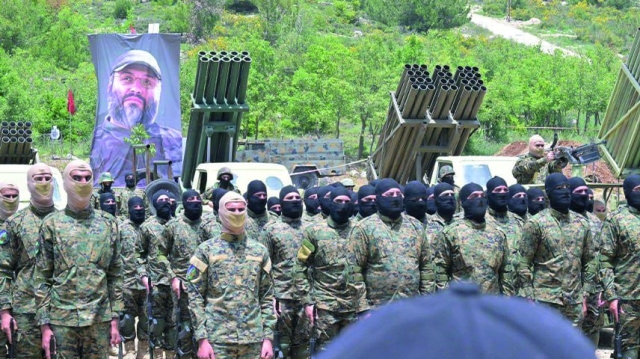In an article published today by the daily newspaper, “Israel Hayom,” it has been emphasized that amidst the internal debates in Israel about judicial reforms, there has been a noticeable escalation in border skirmishes between Israel and Hezbollah. These tensions suggest a growing potential for an all-out conflict along the Israel-Lebanon border.
While the immediate threat involves targeted destruction to residences and potential casualties running into the thousands, the Israeli security apparatus harbors deep-seated strategic concerns. Specifically, there are fears about the possibility of severe disruptions to the nation's core functions. It has been indicated that Hezbollah possesses the capabilities to specifically target and disrupt Israel's energy infrastructure and food distribution networks.
The Iran axis includes genocidal Hezbollah terrorists sitting on Israel’s northern border. The Lebanese terror group, which has been escalating tensions, has 100,000+ rockets and missiles. Make no mistake: If Iran attempts this type of violence, Israel will act to defend itself. https://t.co/wbudtVHjgn
— Israel War Room (@IsraelWarRoom) August 7, 2023
Under what the defense circles label as a "grave but plausible" scenario, Israel may face an onslaught of thousands of rockets in a single day of warfare. Initial projections estimate that during the initial phase of the conflict, as many as 6,000 rockets might target Israeli territories. However, these figures are expected to gradually diminish, dropping to around 1,750 rockets daily as the war progresses.
Israel's security analysts project that out of the rocket onslaught, approximately 1,500 rockets would have a significant impact within Israeli borders each day. These estimates take into account rockets that would either land in open terrains, the sea or get intercepted by Israel's Iron Dome missile defense system. However, there is a prevailing sentiment among defense analysts that the Iron Dome, despite its sophisticated capabilities, might struggle to consistently achieve high interception rates given the sheer volume of incoming rockets.
The current defense projections by the Israel Defense Forces and the Minister of Defense speculate that in a concerted offensive led by Hezbollah, there could be around 500 civilian casualties in Israel, with thousands more injured. This does not account for potential casualties within the IDF ranks. A pressing concern revolves around the precision-guided missile technologies that Hezbollah has integrated into its arsenal, backed by Iranian support.
War Coming Between Israel & Hezbollah? | CBN NewsWatch August 4, 2023 https://t.co/8noWOHOMxg via @YouTube
— Life as it goesTM (@lifeasitgoes12) August 7, 2023
Additionally, drawing lessons from the ongoing conflict in Ukraine, Israeli defense analysts highlight the efficacy of Iranian drones. In the aforementioned "grave but plausible" scenario, the Israeli defense community does not dismiss the likelihood of Hezbollah, with Iranian backing or their associated factions, successfully targeting pivotal static infrastructures in Israel, like power generation units.
The most alarming of these concerns is the precise targeting of power stations, leading to a catastrophic impairment of Israel's electricity production. The domino effect of such an event would be monumental, with disrupted communications and potentially even a failure in the alert systems designed to warn citizens of incoming rockets.


